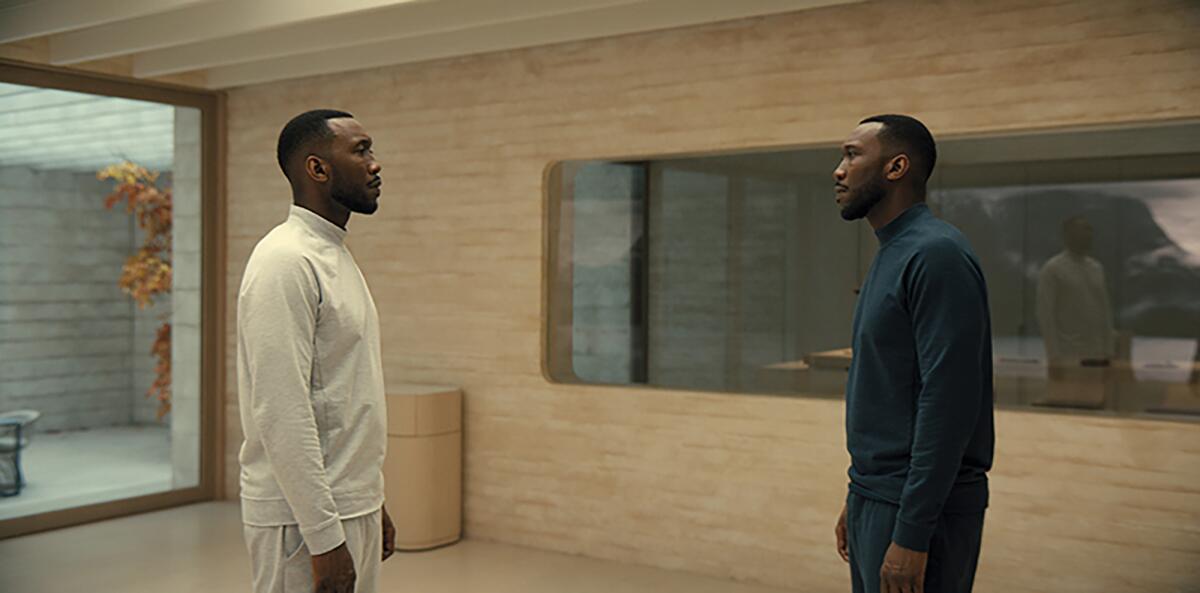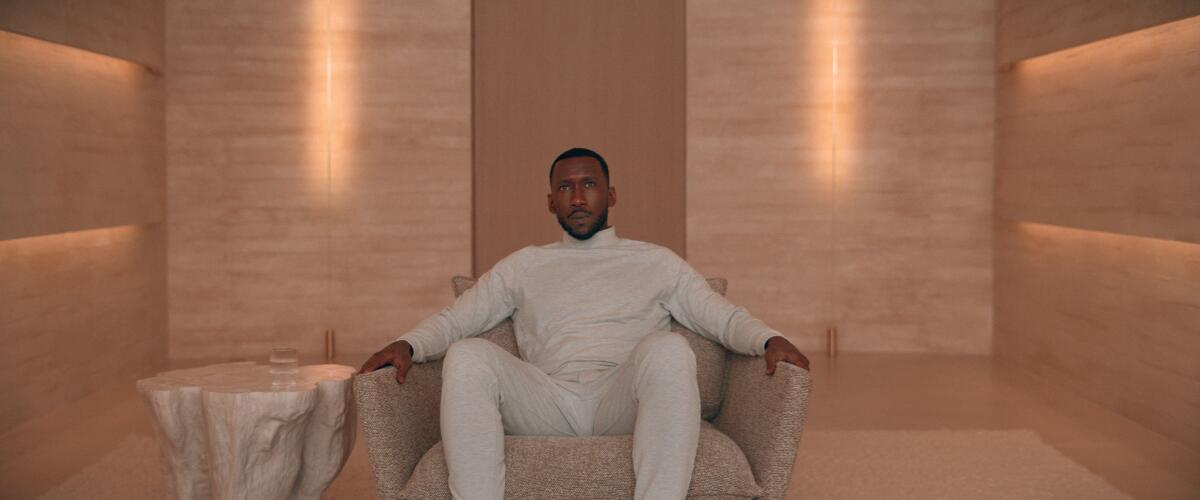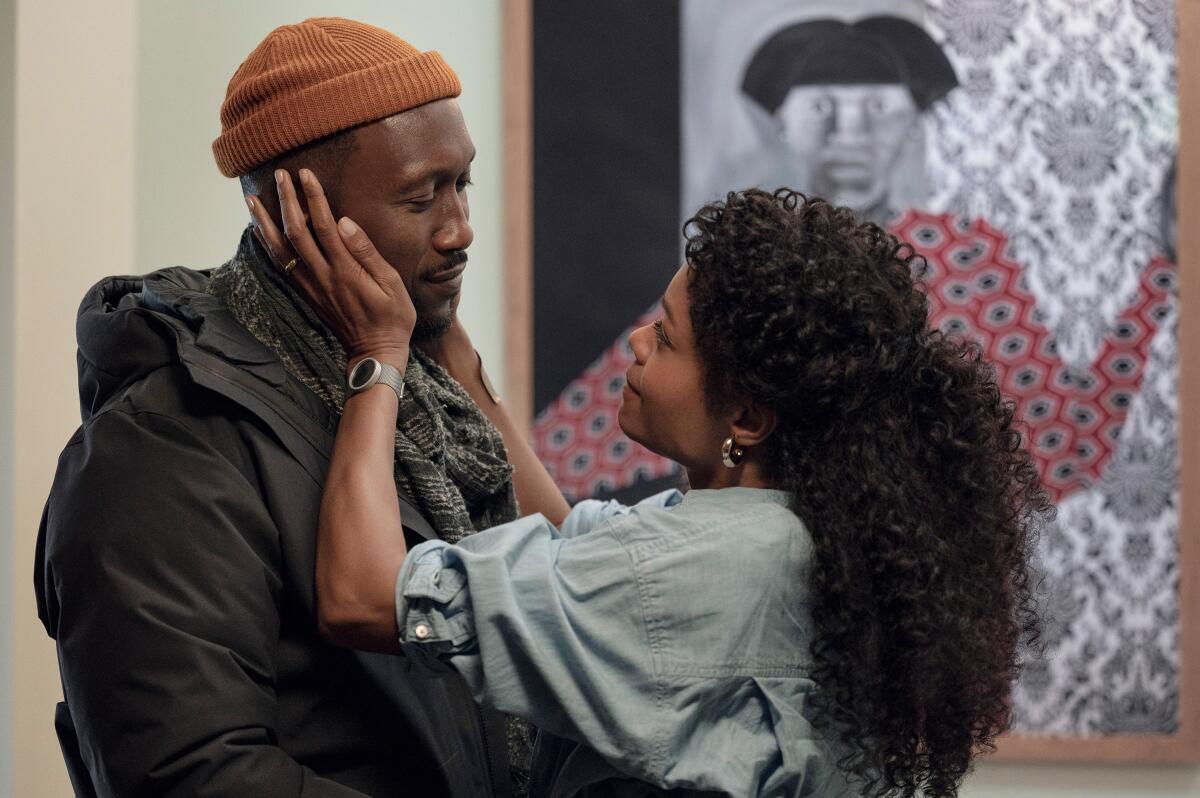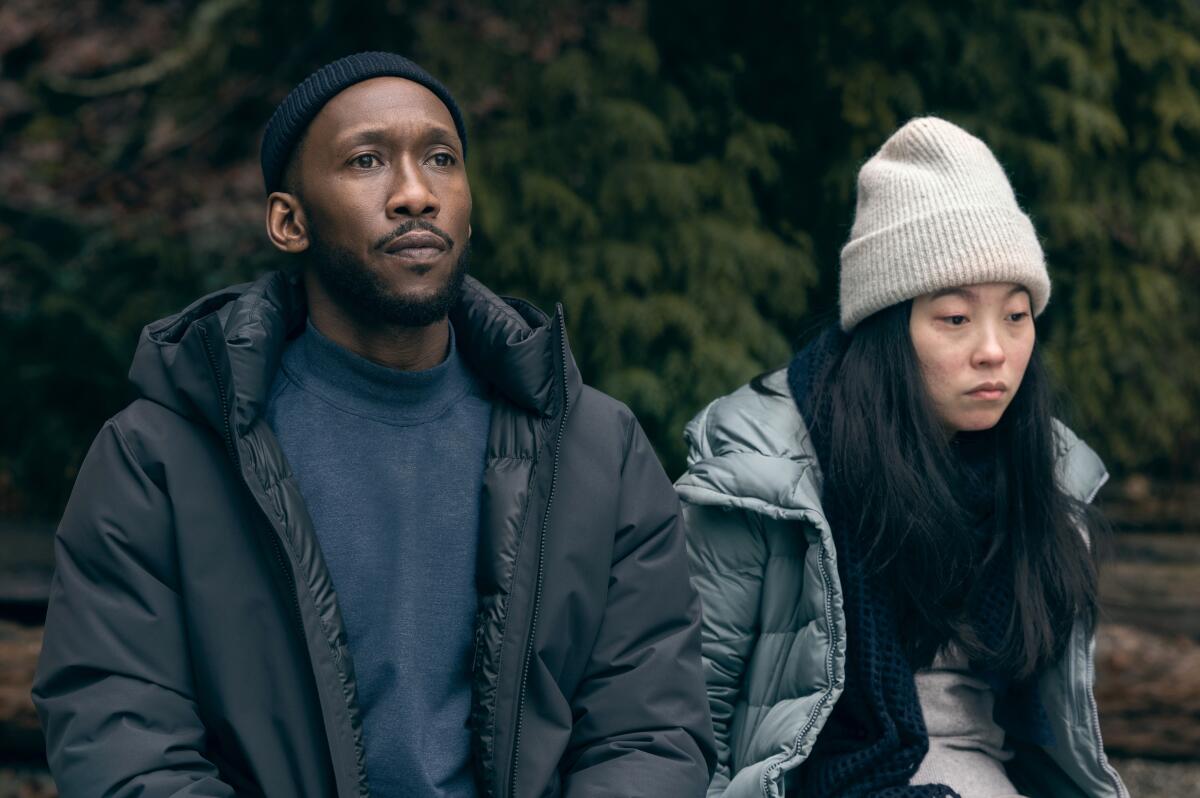How director Benjamin Cleary cloned Mahershala Ali in ‘Swan Song’

- Share via
After wrapping “Swan Song,” the Apple TV+ drama about a terminally ill man grappling with his impending demise, Mahershala Ali took two months off to shed the emotional weight.
“I think the hardest part [of the process] was being in a really vulnerable emotional space for four months,” the actor said recently at DTLA’s Soho Warehouse. “That was really challenging and it definitely wore on me at a certain point. I had to take a couple of months off just to allow myself to come down because it’s very unsettling and not really sustainable to be in that place for very long.”
Written and directed by Benjamin Cleary, the melancholy “Swan Song,” now streaming and playing in select theaters, features dual performances by two-time Oscar winner Ali as Cameron, a family man in extremis and Jack, the clone meant to replace him. Naomie Harris co-stars as Cameron’s wife, Poppy, who is pregnant with their second child.
“The premise was just so good,” said Ali. “I hadn’t really seen Black and brown folks in that space, leading these types of stories. Once I got a chance to sit down and talk to Ben, I was sold. He just felt like a direct reflection of the beauty of the movie. [He’s a] very sensitive, conscious person, which makes sense because the script felt aware and beautiful. Once I got to sit down with him I was just like, ‘Yeah, this feels right.’”
“It was an incredible moment when I heard Mahershala had read the screenplay and wanted to meet,” said Cleary, who makes his feature debut with the film. “I was so close to the writing at that point that I think I’d lost a lot of objectivity.”
Cleary wrote the script years ago as a way of coping with several personal losses. The night before their meeting, the director reread the screenplay with Ali’s voice in mind. “And suddenly the script was completely alive again,” he said. “It just felt like I was right back there again weeping and just feeling it all. And then I met him the next day and we had one of those two-hour conversations. Definitely for me, as a first-time filmmaker ... to get to work with a master of their craft like Mahershala was literally the dream.”
Ali was nominated for a lead actor Golden Globe for the role, a category he shares with Denzel Washington, Will Smith, Javier Bardem and Benedict Cumberbatch. “It’s wonderful to see Mahershala getting recognition for the incredible job he did in this movie,” said Cleary. “I think what he did [in the film] is marvelous. Seeing him share [the category with] those incredible names is great and deserved.”
“It feels like being a human around a bunch of superheroes,” said Ali of the nomination. “Like ‘OK, how’s this armwrestling match going to go?’ It’s super humbling to grow up watching these folks work — these are heavy hitters. And so I feel humbled by being in such wonderful company with people whose work I sincerely admire.”
The Times caught up with Ali, Cleary and Harris to discuss the making of the film, shooting during COVID and working with a estimable ensemble including Glenn Close and Awkwafina.

How were the scenes between Cameron and Jack captured?
Cleary relied on split screens, over-the-shoulder shots and a body double to depict Cameron and Jack simultaneously.
“The main thing that I wanted to do was try to find a way to shoot one actor for two in as untechnical a way as possible,” he said. “Because I knew that from an emotional standpoint this was a very difficult dual role to play. I didn’t really want Mahershala to be waiting around for three hours for us to try and work a big motion control rig. So we tried to do it in more traditional ways. We only used a repeatable head — which is a piece of equipment that allows you to do a moving screen split — once in the film.
“And then from a directing standpoint, it was really about [capturing] it in a way that preserved the incredible cadence, rhythm and soul of Mahershala’s performances,” he added.
“When you’re playing off of another actor, the scene keeps changing because you keep finding stuff [together],” said Ali. “With this, I’m having to shoot one side at a time so there’s no space for that. So I had to play the scene out in my head first and go, ‘These are the things that I want to accomplish in each beat in the scene.’ And I had to just accomplish playing one side well at a time. So it was really a collaboration with my scene partner, Shane Dean, and Ben coming in and trying to curate all the little moments, support the ideas and improve upon them.”
“When he switched over to play Jack, I would take the audio of what he’d done on camera [as Cameron] and play [it back while his body double] Shane Dean would mouth some of the audio,” said Cleary. “So Mahershala was actually acting across from Shane but hearing his own [voice]. I think that was really a beautiful way to give Mahershala a sensory view of himself to play across from.”
How’d you establish emotional and psychological differences between Cameron and Jack?
“I knew this was an incredibly challenging role and something that was going to take a huge amount of nuance and subtlety,” said Cleary. “And I’d always admired that in Mahershala’s roles; I loved how he was chameleon-like and could get into these different characters and feel completely and utterly different. And so I knew that for Cameron and Jack he was going to have to find the difference in that interior world.”
“I had to think of them almost like twins,” said Ali. “If you’ve ever been around twins, you can kind of tell who’s older, even by seconds. And so even though they’re the same person, I had to think about the power dynamic. And so that made Cameron feel like the older brother so any time I was playing Jack, I had to make myself smaller in comparison. I had to humble myself. When you know where the power is in the room, it just changes how you behave.”
“He was thinking ahead about what he might do [as the other character],” said Cleary. “It was just an amazing thing to watch someone that in charge of their craft be able to predict what might work well on the other side. It was kind of a masterclass every single day for myself and the crew, really. Our editor said that within a day he’d forgotten that it was one actor playing two, it just felt seamless.”

What was it like reuniting with Naomie Harris onscreen for the first time since “Moonlight?”
“Naomie is such a courageous actor,” said Ali. “Like me, she’s not one who necessarily wants to spend a lot of time talking about it, she’d rather just jump in. So that was great because I was working with somebody who in many ways was encouraging me to find my best actor within me because things that are naturally easy for her, I’m a little bit more shy about. So being with her was great training. She’s a great coach. She’s someone who encourages you to practice courage, so to speak.”
“We work in this very similar way,” said Harris. “We both don’t really like rehearsing, we like to prep on our own and then come together and just see in the moment. So we’re completely on our toes the whole time and centered in the moment because we have no knowledge at all about what the other person is bringing. And a lot of actors don’t like to work in that way because it’s a little scary not knowing what was going to happen next.”
“It was incredible,” said Cleary. “I’d wipe my eyes after a take and look around the room and just see a whole crew full of people wiping their eyes at what Mahershala and Naomie were creating.”
How did Glenn Close and Awkwafina get attached?
“I think when you get an actor like Mahershala on board, it opens doors because every actor wants to work with [him],” said Cleary. “With Nora [Awkwafina], I’d seen ‘The Farewell’ and absolutely adored it. I thought she did an amazing job and wanted to find someone for this role who was able to tonally shift from a heavier mood suddenly into something lighthearted or witty and a bit comedic, because I really felt like the film needed little palate cleansers wherever possible because it does deal with some heavy stuff.”
“Awkwafina couldn’t have been more humble and really brought light and levity to a story that needed it,” said Ali. “It was amazing to watch her and Ben talk about things and to see how malleable and flexible she was in adjusting to his ideas.”
“And it was another ‘pinch yourself’ moment getting Glenn Close to do the movie,” said Cleary. “She just really wanted to work with Mahershala.”
“She was a joy to work with and that was a dream come true,” said Ali. “Because I don’t know what reality I would ever imagine us getting to work together in. But I did say to her, ‘I would love to work with you one day’ some years back after ‘Moonlight.’ And she said, ‘I’d love to work with you.’ If I was a little lighter, I probably would have blushed, but I blushed inside.
“Glenn is just a master and she asks a lot of challenging questions,” he added. “She processes things in a way that really challenges you to think about everything in broader and deeper terms. And so being around her and getting to work with her was really refreshing and as you would expect, an education.”

What was it like shooting amid the pandemic?
“We were eight weeks out from shooting when we got the news that we were being shut down and had to go back home,” said Cleary. “It was a very strange, uncertain time. We got back to shooting about five months after being in lockdown and I think there was a big sense of gratitude on set that we were able to keep working when a lot of people were not.
“On the other hand, it was a nervous time because there were no vaccines back then,” he added. “And so we were getting tested a lot and there was a lot of worry that at any moment we might get shut down again or some[one would get sick]. You’re constantly wearing masks, the actors had to put on visors between takes, everybody’s getting tested a few times a week, everyone’s living slightly isolated. It was definitely a strange and challenging time but I think what was nice was seeing the human spirit and the camaraderie that came out of the situation.”
“I think the way we had to shoot was probably appropriate for the film,” said Ali. “We would all go back to our corners after getting a shot off or completing a scene. So it was a fairly quiet set. Just with all the regulations, you didn’t have that freedom to move around in the way you did before, which probably worked in our benefit when it comes down to the concentration that the film required. The intimacy, the quiet, the focus, all those things were really necessary for the film to achieve having all the attributes that the story needed to feel full and organic.”
More to Read
Only good movies
Get the Indie Focus newsletter, Mark Olsen's weekly guide to the world of cinema.
You may occasionally receive promotional content from the Los Angeles Times.








